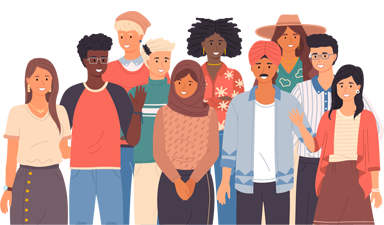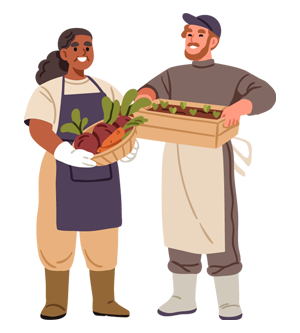Haven - Stories of Finding Home in Maine
Host a Storytelling Workshop
Across Maine, the challenge of finding safe, affordable housing intertwines with the very fabric of our communities. The stories of our neighbors, friends, and colleagues – those who struggle with housing instability – are critical to understanding this complex issue. Too often, the narrative around housing only focuses on supply and demand, failing to capture the nuanced realities faced by Mainers. These realities are shaped by transportation limitations, wealth inequality, wage stagnation, healthcare access, and the aging of our housing stock. These issues compound, creating a crisis that disproportionately affects marginalized communities.
Haven seeks to amplify the nuanced reality we see in our lives and create a space for dialogue, collaboration, and community-led solutions. We envision an online, multimedia repository where policymakers and community members can connect with the lived experiences of Mainers, identify patterns that transcend racial and class lines, and discover creative pathways forward, out of this crisis. The Permanent Commission invites Community-Based Organizations (CBOs) to join this effort by hosting housing-related storytelling workshops. By sharing our stories, we can foster a deeper understanding of the root causes of housing instability and work together to create a brighter future for all Mainers. If your organization is interested in applying, please click the link below to access the brief application. Applications will be accepted on a rolling basis.
- What is a storytelling workshop?
-
We offer a variety of storytelling workshops designed to help individuals and groups share their experiences and make their voices heard. From introductory sessions to creative approaches, these workshops offer methods for recording and presenting stories in impactful ways. Explore the different options below to find the perfect fit for your needs.
 Storytelling 101
Storytelling 101What is it? A one-time introduction to storytelling and space for drafting personal narratives. Focus on deep description and workshopping ideas. Great for large groups eager to share their experiences.
How are stories recorded? Stories can be recorded the old fashioned way with paper and pen or audio or video recorded for more impact.

Photovoice
What is it? Participants generate prompts to guide photo taking, then regroup to share their visual stories and identify common themes. Great for smaller groups who may be hesitant to speak publicly.
How are stories recorded? Through the photos provided and a narrative text drafted collaboratively or attached to individual photographs.
 Collective Storytelling
Collective StorytellingWhat is it? Groups discuss their experiences and identify common themes and stories. Great for small, culturally cohesive groups. Can be paired with movement and/or engage specific cultural storytelling practices.
How are stories recorded? Stories can be shared in writing, as a documentary or oral histories, or through visual notetaking.
 Testimony / Creative non-fiction
Testimony / Creative non-fictionWhat is it? Blending personal narratives of lived experience with scientific data and evidence to show the real impacts of policies within a community. Great for groups looking to sway decision-makers.
How are stories recorded? Often in writing or spoken word. Methods are similar for both approaches, but outputs may be different.
 Speculative Storytelling
Speculative StorytellingWhat is it? An approach to storytelling that projects into the future, looking at possible, probable, and preferable outcomes. Can be useful for diverse groups looking to build a stronger sense of shared goals.
How are stories recorded? Stories can be written down, presented as works of art, or a combination of both.
- Who can apply?
-
We believe all Mainers have a story to tell about housing, and the more stories we hear, the richer our discourse grows. For this effort, we encourage community-based organizations from across the state to apply. You do not have to be a housing-focused organization to qualify for funding. Applicant organizations must be: based in Maine; a registered 501c3 organization, municipal government, or tribal government. Storytelling workshops can take place anytime in 2025. Organizations with multiple affiliated locations across the state should submit a single application. The Permanent Commission is not able to contract with individuals. Individuals wishing to apply must have an eligible fiscal sponsor that is able to enter into a contract with the State of Maine. If you have any questions regarding your eligibility, please reach out to the Permanent Commission at the contact below.
- What type of funding is provided?
-
We anticipate the costs associated with each organization’s workshop to be from $2,000 up to $4,500, depending on the design.
Allowable costs include:
- Space rental for the workshop Light snacks and refreshments for workshop attendees
- Costs necessary to support attendance by community members, including childcare and transportation support
- Material costs, such as writing materials, disposable cameras, printing costs
- Staff time to organize, publicize, attend/facilitate, and follow-up with the Permanent Commission
- Translation or interpretation costs Selected partners will enter into a Low Cost Service Contract (LCSC) to begin project implementation.
Unfortunately, we cannot provide funds in advance, but partners can submit up to two invoices over the course of the contract for work that has been completed and/or expenses incurred. Project budgets must be submitted as part of the application process. An example budget for the storytelling workshop is below.
Staff time: develop promotional materials, coordinate community member attendance, act as facilitator, and attend preliminary and follow-up meetings with the Permanent Commission $1,000 Transportation stipends ($25 x 20) $500 Childcare $500 Materials $250 Total requested $2,250 *example budget
- We think our community would be interested in participating in an event, but don’t have an idea/have the capacity/know how much it will cost. What should we do?
-
Please reach out! Staff at the Permanent Commission can support in the development of storytelling workshops, and in many cases, can assist with facilitating or supporting an event (or training staff at your organization to do so).
Please contact Billale Fulli, the Permanent Commission’s Community Engagement Coordinator, for more information!
- Do workshop participants have to share their stories to the repository?
-
Building a story repository is part of how we have envisioned this work bringing about change and building solidarity across race and class in the pursuit of better housing for all. While all participants will be encouraged to share their stories in the repository, however, no one who participates in these workshops will be required to do so.
Individuals who do wish to share their stories may do so:
- Anonymously, or with their names attached
- In written, audio, or video form
- Through the use of narrative, art, music, or other media.
They may also request to have their stories changed or removed at any time. If collective storytelling processes are used, all those in attendance must consent to the story being shared.

